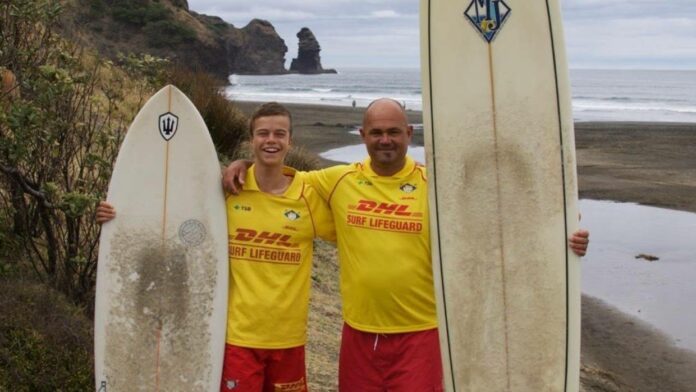Jack Clarke didn’t think twice when he spotted two snorkellers in trouble in a rip.
The 15-year-old had been a qualified lifeguard for just a year when he plunged into the water at Tapotupotu Beach in the Far North to reach the struggling men.
Not far behind him was his dad Duncan Clarke, a lifeguard at West Auckland’s choppy Piha beach for more than 30 years.
“It was a proud dad moment,” Duncan Clarke said of the January 14 incident.
“When I said ‘we need to go’ it was like the flicking of a switch. He knew exactly what needed doing and he just did it.”
The snorkellers’ rescue has prompted a warning from Surf Life Saving New Zealand (SLSNZ), which is increasingly concerned about the number of drownings involving fishermen, divers and snorkellers.
Lifeguards have made more than 157 rescues since Labour weekend 2019 while 12 people have drowned this summer – 70 per cent more than this time last year.
SLSNZ’s chief executive Paul Dalton said his message to anyone heading for the sea, rivers, or lakes was “please, use your head before jumping into the water”.
He said people needed to be armed with the right equipment – be that flippers, life jackets, or leashes attaching kayakers to their vessels – and to never overestimate their ability.
Annual drownings per capita appeared to be going down, Dalton said, though he said two groups were continually problematic: men in their late teens and early twenties, and men in or beyond middle age.
“More than 80 per cent of drownings are men,” he said.
“They think they’re bulletproof, young men whose frontal lobes haven’t developed yet and the older ones who’ve got away with bad behaviour for so long … then when they’re caught out, stressed, perhaps an undiagnosed heart issue means they’re not as strong as they thought they were.”
Dalton said unusually windy conditions had contributed to this summer’s high rescue and drowning rates to date.
Wind helped create waves and “generally not ideal conditions for water activities”, he said.
The Clarkes had been enjoying a summer break and were strolling on the beach with their surfboards when they saw the snorkellers heading into the water with masks, but no flippers.
But by the time the father-son rescue team had reached the rocks it was obvious something was wrong.
The men were throwing objects around and going under the water, with the older of the pair raising his hand and yelling out for help.
The rescuers had a quick strategy talk before springing into action, deciding their surfboards were going to be the only thing they had that could be used as flotation devices.
Jack Clarke reached the men first, spending 20 minutes keeping the men calm, and they were able to ride the waves back to shore.
“They were both absolutely knackered by the time they got to the beach,” Duncan Clarke said.
“The young fella was clutching his knees, bending over and having a cough.”
The man, aged in his 40s, and his nephew, in his late teens, thanked the Clarkes for their help and said it had been a “close call”.
Duncan Clarke has rescued people before but this one was different.
“I’m used to having quite a bit of equipment available to use like boats and rescue tubes, so to paddle out through the surf on a longboard is a totally different kettle of fish.”
Jack Clarke said his first-time rescue was completely unexpected, but “it’s just what we are trained to do”.
This year’s drownings include a 40-year-old Wellington man who died saving his son who had fallen from a wharf, a Tauranga mother who got caught in a rip with her partner of 15 years in New Plymouth, and father and son Darren and Josh Southon who died on the Wairarapa coast while diving.
Source - stuff





























